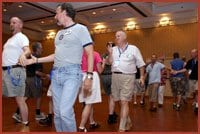MONTREAL. Forget about big, long skirts and ruffled pettipants or cowboy boots. Gay square dancing was in full swing between Aug 2-4 at the Delta Hotel and shattering myths that square dancing is just for ‘squares.’
“When people think of square dancing, they think of it as being ‘square,'” says Ottawan Pierre Bourguignon, who fell in love with this social activity 20 years ago. “But once people get it, they smile a lot.”
Adds Larry White, founder of the Ottawa Date Squares: “One of the challenges in the community is going beyond the stereotype that square dancing can be a boring activity. We need to go beyond those myths.”
Lots of smiles and shouts and different maneuvers were seen on the hotel’s dance floor. Square dancing was among the six cultural programs that the public was invited to join. You didn’t need to come with your own partner, nor belong to a club.
Some members of the Ottawa Date Squares, including Bourguignon, were in Montreal to take part. As disciplines go, square dancing takes a good memory and a strong ability to multitask, says White.
“It’s all about learning how to do everything at once.” In Ottawa, they meet twice a week to accelerate that learning.
Listening to calls like “slide through” or “California twirl,” it’s difficult at first to comprehend the maneuvers — even more so when there are eight men in one circle. Many straight women who participate in square dancing are fascinated to see men dancing both the “men’s” and “women’s” roles, says Bourguignon. Many gays can dance both the man’s and the woman’s parts with a good sense of position and set orientation.
White colaunched the Ottawa Date Square with his partner more than a decade ago. So far, about five to seven members have joined the club annually.
Once you’re hooked, there’s apparently no going back. Cornwall’s group, The Seaway Rainbow Squares, can boast members who started in the Ottawa club and continued dancing after they moved to the smaller community.
The International Association of Gay Square Dance clubs counts four clubs in Canada, one in Japan while the rest are in the US.
“While the instructions might be in German, the call will still be universally English,” says Bourguignon.
Don Moger, one of the callers at the event, says square dancing might be part of one of the competitive sport in Copenhagen, Denmark where the next Outgames will be held in 2009.
To date, queer sporting groups have considered square dancing a social activity. But Moger points to its highly competitive nature. Participants need to focus on the calls while forming tight formation. Failure to listen can break the formation.
After 32 years as a caller, teaching square since 1975 and travelling widely, square dancing has given Moger a new set of calls in life.
“It’s hard to explain, but everybody is good,” Moger says. “It’s just the way it is. They’re lifetime friends.”

 Why you can trust Xtra
Why you can trust Xtra


